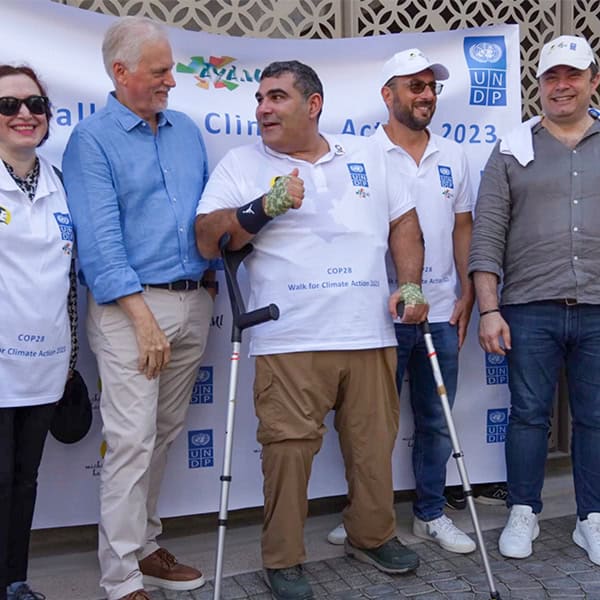At COP28 on Built Environment day, 6th December, a group from the Cracknell team walked with Michael Haddad, UNDP Regional Goodwill Ambassador, in support of Inclusive Climate Action.
Group Design Directors Robert Shakespeare and Fady Khalife, and Horticulture Director Colleen D’Souza were joined by members of the Cracknell team as they walked across the Green Zone with Michael to highlight the need for those with differing accessibility needs to have equality in making sustainable life choices, and to have full participation in measures to mitigate and adapt to climate change.
Robert Shakespeare spoke for Cracknell at the event to pledge the company’s support for Michael’s message and to “vow to continue to drive forward with building inclusive and accessible cities and landscapes, working together with our clients and partners to create a public realm that meets the needs of all.”
We were pleased to see Michael was accompanied on the walk by a significant group that included one of our clients’ clients, Red Sea Global, represented by Scott Henshaw, as well as of course the Landscape ME team.
At Cracknell we support the UN Sustainable Development Goal (SDG) 10 Reduced Inequalities and SDG 11 Sustainable Cities & Communities by driving inclusion and accessibility in the landscapes we design in order to enable resilient and sustainable lifestyles for all.
For instance, last year we facilitated the planting of over 41,500 trees, contributing greatly to urban greening and providing the opportunity for those in warmer climates to use outdoor spaces more comfortably. It’s well known that green spaces offer health benefits to all by reducing the ambient air temperature and improving air quality but there are additional benefits to those with disabilities which is estimated at around 16 per cent of the world population or 1.6 billion people. For example, trees can serve as directional cues to persons with visual impairments, exposure to green spaces has mental health benefits for persons with dementia and being amongst planted environments reduces stress, which can particularly affect persons with disabilities. With one of the four causes of disability being aging, almost everybody will pass through a stage in their life when these considerations will be paramount.
In our masterplans in the MENA region we have created micro-mobility loops for cyclists, electric scooters and those using prams, wheelchairs, and mobility aids, ensuring that these routes pass regularly through ‘cool-spots’ shaded by trees and cooled by water features or natural breezes channelled from the coast via orientation of the streetscape design and building massing. Access to nature for all is vital if we are to empower everyone to understand and engage with the natural world and its protection. This includes the design of boardwalks and kayaking routes through preserved and newly planted mangroves, creating opportunities to view coral reefs from suspended nets, the creation of observatories in preserved wildlife habitat sanctuaries, and the design of resorts that protect, preserve and enhance turtle hatching sites for all to view without impacting the habitat.
Facilitating inclusive environments can however sometimes be challenging, and there are specific issues in the MENA region that need addressing through awareness-raising in order to unlock the full potential of the public realm. These include:
- a fresh perspective on health and safety and an increased understanding of the benefits of ‘risky play’ in order to allow for more engaging, inclusive and hands-on exploration of the urban environment;
- a willingness from all parties involved in development to collaborate with neighbouring developments to facilitate a cohesive access network for the mutual benefit of all;
- the forward planning of access pathways and ramps for all facilitating free movement without street furniture and signage causing obstacles – too often seen with retrofitting of routes;
- the integration of inclusive access integrated with urban mobility and transport systems, including signage, ramps and information systems designed for all those facing challenges;
- the collaboration by all parties on providing ‘entry fee free’ access to open space that is within a few minutes reach by all.
In joining the ‘Accessibility in Landscape’ initiative we look forward to working collaboratively throughout all our business relationships to help combat common challenges found and realise the opportunities to contribute to more inclusive thinking within the built environment.
Access by all to nature and to cities and infrastructure is vital to ensure opportunities for engagement with and participation in climate action at every level – a resilient and sustainable future is most certainly an inclusive one.


